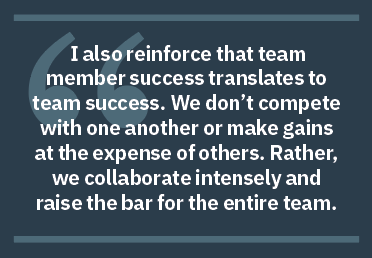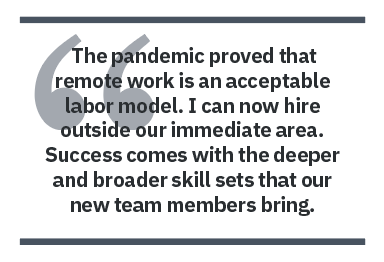Roberta (Bobbi) Werner | STC Fellow
Success as an individual contributor does not promise success as a manager; a distinct skillset and approach are required to succeed in the manager role, which can make the transition difficult
It’s not uncommon for a “rock star” individual contributor to be promoted to manager, but the skills, performance, and mindset that make the contributor stand out and earn a promotion in the first place can hinder success in the manager role. I strive now to be a “rock star” manager, but that designation doesn’t flow naturally from the success I knew as Lead Writer. It comes only after considerable time, study, and effort. This article includes an analysis of my experience working through this transition.
Discovering and Filling in Knowledge Gaps to Manage a Team
When I became a manager, I knew almost immediately that my knowledge of the business and rationale for corporate decisions was sorely lacking. To establish my credibility as a manager, I needed to learn quickly and prove I had the right stuff for the role. When I was an individual contributor, my lack of business savvy never interfered with my performance. As manager, however, I have become a conduit. My leaders and my team expected me to present project roadmaps, to explain the variable support for tools and professional development based on budget, and to grapple with the overall conservatism regarding headcount and its impact on my team. It helps to have a mentor to develop a critical understanding of these and other aspects of the business. I am fortunate to have two, and both enhance my ability to manage effectively.
Becoming the Official Voice of Technical Communication in the Organization
I didn’t realize until a few months into the job how much I loved being spokesperson for my team or the authority for all things technical communication (tech comm). That’s not to say that I know everything or that my knowledge exceeds that of my team. Far from it! It’s being the “go-to person” that brings me unanticipated pleasure. Of course, it helps to know what I’m talking about when I use that official voice, so my quest to be informed and fill in knowledge gaps continues.
Defining Team Success and Promoting Individual Career Development
Tech comm at Hillrom Skaneateles has always been a high-performing team with a reputation for quality and reliability. This reputation attaches to both the team and the individuals within. As manager, I need to ensure individuals are undertaking specialized projects or roles that support their career path and develop them professionally. I also reinforce that team member success translates to team success. We don’t compete with one another or make gains at the expense of others. Rather, we collaborate intensely and raise the bar for the entire team. Without exception, team members understand and appreciate the attention given to them and their individual goals, and this individual focus recharges their commitment to the team.
Managing Workload in an Under-Resourced Environment
My company experienced numerous changes over the past few years, including the closure of a site that was home base for 40 percent of my team, two members took medical leave, and another who accepted early retirement. To say the company is slow to backfill these positions or add to headcount is an understatement, so we needed to engage contract labor to have any hope of meeting the demand for tech comm services and not put undue burden on my team. I don’t want them to jump ship, after all!
At this writing, I have a full-time staff of eight, one part-time writer, and four contractors. Managing this many people can be challenging, but the alternative of having too few team members to cover projects is even more daunting. Success here involves better distribution of work to promote retention and positive morale.
 Securing Tools and Resources to Streamline Our Work
Securing Tools and Resources to Streamline Our Work
As manager, optimizing our effort and streamlining our work is key to success. I strive to stay current with the latest innovations and technologies and to also tap my team for recommendations to achieve our goals. It has been exciting to observe the team embrace opportunities to eliminate manual work, to set up automatic processes, and to share their discoveries and inventiveness with the team. If new tools or specialty software support these efforts, we make a business case to justify the expense. We prove that the investment was worthwhile by delivering on the objectives we cited in our proposals. Success is even more sweet when it extends to other departments and business units.
Managing the Crush of New Regulatory Standards and Corporate Initiatives
Over the last two years, we have completed over 70 projects at my local site to achieve compliance with the European Union Medical Device Regulation (EU MDR). We hired four contractors to tackle these projects alone, but we witness a steady stream of regulatory changes that influence our documentation both domestically and internationally.
Corporate initiatives include rebranding our products and user documents to clearly mark them as Hillrom rather than Welch Allyn. As Hillrom acquires more companies, the scope of our work increases as well. We measure success by how we keep pace with the changing requirements.
Responding as Manager
My team is not immune to interpersonal issues that bubble up and challenge relationships. Fortunately, these incidents are rare — we typically get along famously. When new people join the team, especially when they bring the baggage of unpleasant past work experiences, sometimes they jump to conclusions and level unfair accusations against their new colleagues. As manager, I step in immediately and insist the parties talk to one another. I do not tolerate backbiting or disrespectful behavior, so resolving these issues quickly and clearing the air is critical to the success of the team.
Promoting Professional Development When Resources and Time Are Limited
I’m grateful that my management has supported my involvement in the Society for Technical Communication (STC) and corporate value program memberships for my writers and illustrators. Hillrom also allows us to use office space and tools to host STC and other professional development events. I have been successful getting funding to attend conferences that provide extended access to recordings I can share with my team. I have no problem scheduling professional development events during the workday to facilitate attendance and provide access to new and interesting ideas that inform our practice. I strive to promote the development of my team in the most cost-effective way possible.
Assessing the Performance of Direct Reports Who Once Were Peers
Evaluating my former peers concerned me the first year I completed performance reviews. I wasn’t sure what to expect, and I wanted to be fair above all else. My manager helped me to develop a healthy perspective about these assessments and to ensure they were appropriately complimentary, helpful, and challenging. My own history of disappointment with how little feedback I received in performance reviews prompted more detailed commentary in my assessments, and my team seemed to welcome the detail and thoughtfulness of my comments. I pay attention to the individuals on my team and provide feedback they value.
Adjusting to Impacts of the Pandemic and Other Crises
The pandemic has been a challenge for everyone, but my team was able to take the move offsite in stride and maintain a high level of productivity. Hillrom set us up with the remote communication tools we needed to interact one-on-one and as a group. I hold two weekly meetings with the entire team and bi-weekly one-on-ones with individual team members. We also use informal chat to stay in touch, and I make it clear that the team can reach out to me as needed to address emergencies or quick questions.
 In many respects, the pandemic enhanced our communication. It also proved that remote work is an acceptable labor model, which enabled me to hire staff outside our immediate area. In addition to our full-time upstate New York staff, I now have a full-time writer from Texas and contractors from around the country. I love that geography no longer constrains who can join my team, and success comes with the deeper and broader skillsets these new team members bring with them.
In many respects, the pandemic enhanced our communication. It also proved that remote work is an acceptable labor model, which enabled me to hire staff outside our immediate area. In addition to our full-time upstate New York staff, I now have a full-time writer from Texas and contractors from around the country. I love that geography no longer constrains who can join my team, and success comes with the deeper and broader skillsets these new team members bring with them.
What no one anticipated was my own bout with COVID-19. I was hospitalized for 18 days in December 2020 and then was on disability until the end of January. During this two-month hiatus, my manager stepped in to provide guidance and direction, but the team also rallied and stood in the gap. I couldn’t have been prouder of them and how they toughed out this really trying time for all of us. In March 2021, the sudden passing of my manager, who was also my mentor and champion, tried all of us once again, but our culture of caring and resiliency amid crisis surfaced as our greatest success.
Recalibrating My Personal Definition of Success
As an individual contributor, I measured success by the quality of my deliverables, my consistency meeting deadlines, and the number of times project managers requested me as lead writer. As manager, my “deliverables” are entirely different. I contribute to budget negotiations with detailed cost estimates and justifications for expenses. I write annual performance appraisals for members of my team. I write statements of work and chase down division directors to provide detailed financial commitments to support contract labor. I compose best practices documents that define for my team and other audiences how to improve and streamline processes. I write dozens of emails each day answering queries, troubleshooting problems, assigning resources, and running interference in various ways for my team.
These “deliverables” yield a different kind of joy when they benefit my team, improve our process, or simply get a job done. I also experience success just by being decisive. That doesn’t mean that my decisions are the best 100 percent of the time, but I so dislike being held back by inertia (indecision) and strive instead to move in a productive direction. I especially enjoy it when my most senior team members can be decisive and not rely on me to approve their choices. I want them to trust me when I say they should lead and act confidently.
Team Success
After almost four years in this role, I can say with confidence that I am catching my stride; being a manager suits me. Even more gratifying is that others have taken notice. For the first time in my Welch Allyn/Hillrom career, I earned an “Outstanding Performance” ranking, followed by promotion to senior manager last February.
Have I become that “rock star” manager? Perhaps, but my success as a manager requires a deliberate and consistent focus on the team. A familiar adage says, “There’s no ‘I’ in TEAM.” I contend that the adage applies to managers of teams as well. A manager striving for personal success or accolades could compromise her success as a manager. Her success depends on the success of the team, and her mission is to promote team success. My amazing team makes my job so much easier and more fulfilling than it might otherwise be. I’m grateful to them and to all who have inspired and supported my work as a manager.

ROBERTA (BOBBI) WERNER (stc.bobbi.werner@gmail.com) was promoted to Manager in March 2019, and Senior Manager of Technical Communication, Hillrom Skaneateles in February 2021. Bobbi has earned Regional Technical Communication, STC Alliance, and International Summit Competition awards. She has held multiple leadership roles in both STC CNY and STC Rochester, and she mentors several STC members through the Mentor Board. She is in her first term as treasurer on the STC Board of Directors.


